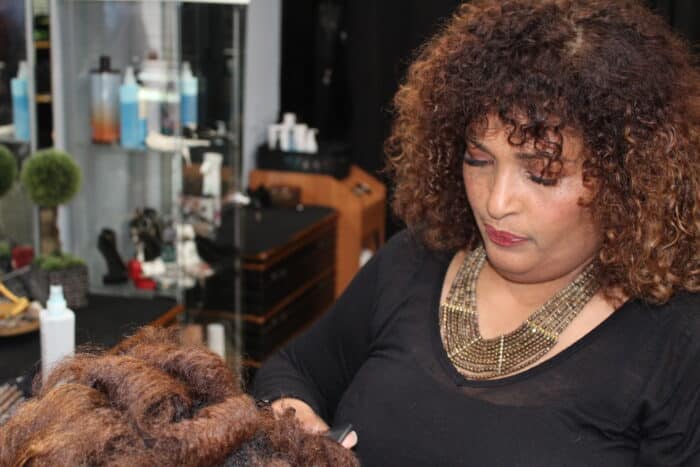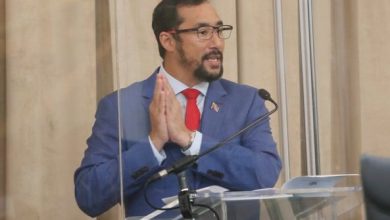Black hair: The price, joy and beauty of it all

Kerene Edie walked into Hair By Dee in Van Nest for her 1 p.m. appointment on Feb. 20 in bejeweled jeans and a blush pink sweater. Her demeanor was light and her smile wide as she greeted Denisse Uribe Palin, the owner of the hair salon, before her appointment — but getting her hair done hasn’t always been a lighthearted affair.
That’s because as a Black woman with ethnic hair, Edie has had trouble finding the right products for her — not just shampoo and conditioner, but also products like hydration and moisturizer, combs and brushes and everything that comes with protective hairstyles. In fact, Edie said Uribe Palin is one of the few stylists she feels comfortable with — she’s had friends with ethnic hair who’ve had hairdressers slip relaxers into conditioner bottles.
That relationship of trust with a stylist hasn’t come without years of trauma, trial and error with other people and products.
“I have to be able to entrust my hair care with whoever it is that’s putting their hands in my hair,” Edie said.
Dee
Uribe Palin is well-educated about ethnic hair. She’s got her own curly-hair routine down pat and asserts that each of her clients has their own unique hair texture and personality.
“To me there’s not [one] identity because we’re all the same,” she said. “Different textures, different colors — but that doesn’t affect [you] when you love your job and you do it from [the] heart, and not for money.”
Originally from the Dominican Republic, Uribe Palin first came to New York City in 1993 when she was 21 years old. After she had her daughter in 2002, she returned to her home country, but moved back to the city permanently in 2005.
The curriculum at her high school in the Dominican Republic included a sort of internship program where students could choose to get real-world experience by working in food service, natural recreation, literacy or cosmetology. Uribe Palin chose the latter but didn’t make it her career until she got to the U.S. — a full 180 from her work as a police officer in the Dominican Republic.
She first started as an assistant at a salon and then moved her way up to being a full-time stylist with multiple professional certifications and clients of her own. She worked at a salon in Van Nest for 14 years under four different owners before she bought her own space in 2017.
Denisse Uribe Palin styles her client’s hair at her salon in Van Nest on Tuesday, Feb. 20, 2024.Photo Camille BotelloDenisse Uribe Palin pulls out some of her class workbooks at her salon in Van Nest on Tuesday, Feb. 20, 2024.Photo Camille Botello
“I got the privilege to work in what I love,” Uribe Palin said. “Some people don’t.”
She lost her old salon during the COVID-19 pandemic, a time when almost everything — especially close contact businesses like salons and barber shops — were shut down or permanently closed. Uribe Palin was creative though — offering Instagram video tutorials for hair care at home and even training her clients’ husbands and boyfriends to color their ladies’ hair.
Uribe Palin told the Bronx Times that she tries all her products before using them on clients so she’s confident they’ll work well with her base — which are primarily Dominican and Puerto Rican women, as well as Black women with ethnic hair. And to date, she said she’s taken 22 clients off perms by encouraging them to sport their less harmful, natural hairstyles and educating them on best practices.
On the price list by the front door of Hair By Dee, the hair relaxer menu item doesn’t have prices next to it — just the word “discontinued.”
The salon owner landed back on her feet after the pandemic, reopening Hair By Dee at 1740 Holland Ave. in Van Nest in just two weeks. It’s a small salon — a few chairs with vintage hair dryers, three for cutting and two in the back for washing, but it’s warm and inviting. Before Edie’s appointment on Tuesday a stick of incense burned in the entryway as the natural sunlight illuminated the space.
The price of Black beauty
The primary theme that kept appearing during Edie’s interview while she got her hair washed, trimmed and styled was trust and acceptance — trust in someone else to properly care for her hair, and acceptance in her natural beauty.
Edie said she remembers all the times her curly hair was pulled too hard and how people growing up would tell her she should “fix” her look. Edie said the microaggressions and the physical pain of her hair care was enough to make her want to use relaxers to make her hair straighter.
“I always grew up thinking, ‘Oh my God, I want to perm my hair,’” she said. “We were raised to understand that our hair was bad… young girls, women, that’s what we would hear.”
Growing up in Jamaica, too, Edie said her family couldn’t afford to take her or her sisters to the salon. Their mom usually did their hair.
Kerene Edie gets her hair washed, trimmed and styled at Hair By Dee in Van Nest on Tuesday, Feb. 20, 2024.Photo Camille Botello
Essence — a lifestyle, fashion and beauty magazine by and for Black women — reported in 2020 that Black women spend about $53 million in hair care “preparations” out of the annual total of $63 million spent on hair care.
Similarly, the African-American newspaper covered a survey conducted by All Things Hair last year that revealed 21% of Black women spend more than a quarter of their monthly budget on hair care — compared to 5% of white women who spend that much on their hair monthly. The survey also showed that Black women go to hair salons most frequently out of every ethnic group studied, but that they also have to travel furthest to get to a place where stylists can adequately work with their hair types.
Edie said people without textured hair can get away with using just a few products, “but for me, I need six or seven products before I get to the desired result.” And while people with textured hair often wash their hair less frequently than people with straighter hair, more product is needed.
At Hair By Dee, a wash and blow combination for “large” hair costs $70. That price jumps to $175 for keratin conditioner, $225 for full hair color, and $325 for a keratin treatment. Edie pointed to a full-size bottle of conditioner on sale for $40 at the salon and said when she had longer hair, that may have lasted her just three washes.
“So yeah, it can be expensive,” Edie said.
Kerene Edie sits under the dryer at Hair By Dee in Van Nest on Tuesday, Feb. 20, 2024.Photo Camille Botello
The combination of the high cost of salon treatment, the effort it took to do her hair, people criticizing her natural locks, and her and her mom’s lack of education of textured hair care made Edie think less of herself.
But even with the strife and trauma that came with her personal wellness routine, Edie said her mom always encouraged her and her sisters to find beauty with their natural hair. During her interview with the Bronx Times in the salon chair, she gushed over her natural hair a few times.
She recently got it cut shorter than she’s ever had it, her natural curls extending just a few inches from her roots when she’s not wearing a protective hairstyle — hairdos that guard natural locks from elements that can harm the strands or stunt growth — like braids, twists, hair weaves, wraps, wigs, locs, and knots.
Protective styles, as they’re called in the U.S., are more than just temporary looks — they hold profound cultural and historical significance to Black communities across the globe. In a story about the history and versatility of protective styles, Allure Magazine reported that depictions of women in cornrows have surfaced in Northern African paintings dating as far back as 3,000 B.C. Many Black slaves in the U.S. were forced to shave and/or cover their heads as well — for sanitary purposes while they lived in inhumane conditions, but also to erase their identity, according to the National Institutes of Health.
More recently in the U.S., Black people continue to be discriminated against and stereotyped for their natural hair and chosen protective styles. Even in the age of the Crown Act (Creating a Respectful and Open World for Natural Hair) — a law that passed in the U.S. House in 2022 that prohibits discrimination on the basis of hair texture and hair style — people in the Black community still face prejudice at school and work.
Denisse Uribe Palin styles her client’s hair at her salon in Van Nest on Tuesday, Feb. 20, 2024.Photo Camille Botello
Edie said she’s starting to see a positive cultural shift surrounding Black hair, a shift that will hopefully be even more visible as her 5-year-old daughter Isabelle grows into a teenager and adult.
She already practices self-care with her daughter, who was the inspiration behind her beauty line Belle’s Essential. Edie does this intentionally with her 5-year-old, teaching Isabelle how to comb through her doll’s locks — a doll that looks and has a similar hair texture to her.
“This is why I started my company, for her,” Edie said. “Once we understand that there’s stuff there to help make the journey easier… it’s worth it. It’s not that I don’t think our Black women don’t love our hair, it’s just some of us are intimidated by dealing with it. And I understand.”
As Uribe Palin removed Edie’s rollers she began to blow dry and trim her ends. The pair laughed and talked about girlhood and womanhood, their kids, their exes and current partners, their friends, their friends’ exes and current partners, and their jobs.
Kerene Edie sits with rollers in her hair in Van Nest on Tuesday, Feb. 20, 2024.Photo Camille Botello
Edie looked in the mirror and smiled after Uribe Palin removed the nylon hairdressing cape from the back of her neck.
“I love what I do, I invest a lot of money, sacrifice, sacrifice in my family,” Uribe Palin said. “But it’s worth it when I see people smile.”
Reach Camille Botello at cbotello@schnepsmedia.com. For more coverage, follow us on Twitter, Facebook and Instagram @bronxtimes




